Thanks for clicking into our end of the year coverage! Merry-Go-Round Magazine is an independent culture site funded by people like you! If you’re enjoying our End of 2024 Coverage, consider becoming a member of our Patreon, or even donating to our operation here! Between now and January 1st, you can get one of our amazing crewneck sweaters if you become a Patron at the $5 tier! Thanks in advance for supporting MGRM!
It’s not a closely guarded secret that the video game industry is not doing well right now. I’m currently part of a Discord of 8,500+ users who are either looking for work or looking to provide advice to under-employed potential game devs and gaming industry hopefuls. You may have heard of this group before as the founder of the server, Amir Satvat, was recently recognized at the Game Awards for his work in building the server and the spreadsheet of potential jobs that powers it.
As with any industry, a lot of the issues facing tech and gaming are nuanced with several shades of gray. Still, at the risk of oversimplifying, I can’t help but feel that a lot of issues are tied to major gaming studios looking for their live-service cash cow. Everyone wants their Call of Duty, everyone wants their FORTNITE, everyone wants a widely lauded machine that reliably prints money. Sounds simple enough!
Of course, it’s not simple. It’s a miracle that anything ever gets made, ever, and building a live-service online game with the wow-factor to reliably draw hundreds of thousands of players is a colossal undertaking. But with so many factors in play, I can’t help but think that what a sizable amount of gamers are interested in is the story that they’re involved in.
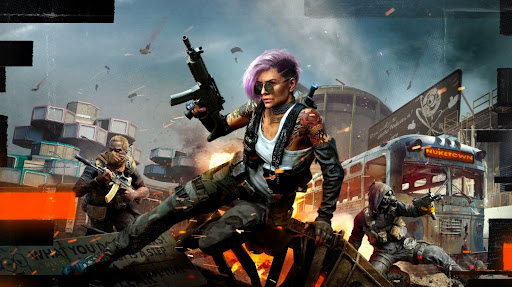
Now, some players don’t care about the story. There are games that get by without offering any real explanation for why you’re doing what you’re doing, and often they’re free to do this simply because of the game’s design. The classic formula of “shoot more dudes than the other team” doesn’t always need a three-part miniseries explaining where the main character got their gun and what happened to their dad. But what I’m saying is it can help.
One of the things I’ve learned at the end of the year is that I’m still very salty about what happened to Bungie and DESTINY 2, post-THE FINAL SHAPE. Most people with a passing familiarity of DESTINY 2 know that it’s a decade-spanning franchise with a labyrinthine, byzantine lore that is oftentimes background dressing to the world that the player explores. But all of that story and background invariably led to the events of THE FINAL SHAPE expansion released earlier this year. It was a huge moment for DESTINY 2 players, who were boarding the hype train with a mix of caution and fevered anticipation.
And man, did that hype train pull into the station. With the effusive praise lavished upon it by critics and fans, Guardians the galaxy over were eating very well.
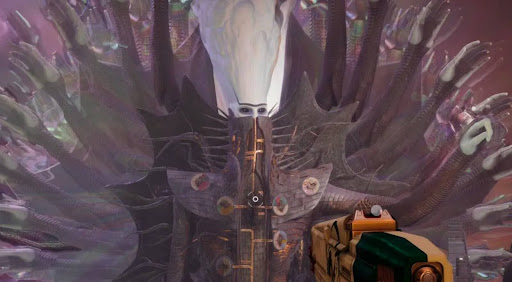
But now that the existence-threatening Big Bad is defeated, where to go with the story? Previously DESTINY 2 expansions would be released in seasons with weekly lore drops playing out therein, but now Bungie has shifted to “Episodes,” three-part de facto seasons that deal with a particular aspect of cleaning up after the Big Bad’s destruction. They’re opportunities to refocus on and examine villains that have appeared in past expansions and see what they’re up to, but it’s been less than thrilling to check up on them. Part of it is simply that the stakes have been significantly lowered; yeah, it’s probably not good that an aspect of the Witness has found itself in the clutches of a fanatic zombie who is looking to zombify our allies, but it’s not like the universe is being turned into a horrifying Cubist-Cronenberg mashup anymore. Certain narrative weak points come due to game design or the way the story is dispensed. The seasonal story updates in DESTINY 2 have always had a vague, early MMO fetch-quest feel to them, but as of late it’s been more of a “do this X amount of times and we can move on” loop. The work the character is doing doesn’t always feel meaningful outside of the looter-shooter aspect of it all.
Online versions of Rockstar’s games also operate with minimal narrative. I tried my hand at RED DEAD REDEMPTION 2’s online mode, but it never really gripped me because other than being a ridin’ ropin’ cowpoke I wasn’t sure what I was supposed to be doing. Initially the player has been framed for murder and released to help find the varmint what got them sent to the clink, but after that it’s a big wide world to explore and the only goal seems to be “become the best,” whatever that entails.
I can’t rightly condemn RDR2 Online because this is the same template as GRAND THEFT AUTO V’s online mode, and that has proven to be the fabled money-printing machine that Rockstar has been looking for. That cow’s been giving milk for years and years at this point, and the only thing that seems to be in its way is the impending release of GRAND THEFT AUTO VI. Clearly becoming the best is a fine impetus for gameplay, but I’d argue that there’s a good amount of players that need a little bit more to get them there.
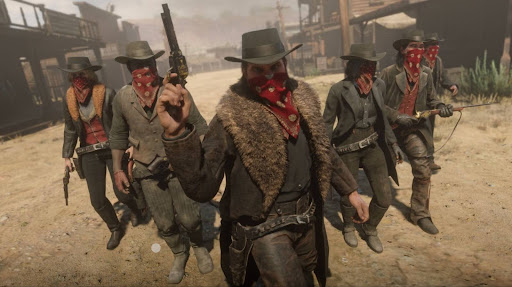
I’ve hoped to imply throughout this that the nature of the storytelling should serve the gameplay. MINECRAFT alone seems to have dismantled the argument for story, but I would point out that the franchise has bent more and more towards having a narrative over time. It’s important to administer it properly, however—with that, we should at least touch on CONCORD, a game that was ostensibly made to be Sony’s money machine and bit the dust just as ostensibly.
Let’s go back to that “shades of grey” cliché I dropped earlier: There are a lot of reasons why CONCORD tanked the way that it did, and there’s many that feed into and overlap one another. This was a game that had extensive lore and backstory, but reportedly wouldn’t let anyone see too much of it. It was hidden behind a lore tab, similar to how DESTINY 2 handles all of its extended lore, and only some aspects were unlockable through challenges and achievements. Reviews mentioned a storytelling strategy of revealing one or two mocap scenes at a time per week to hash everything out. As a result, the wider public doesn’t know whether it had a completely awful story or a genre-redefining one, and we never really knew enough to give a real opinion. One day when the NDA expires the story bible will circulate among writers and developers, just as the concept art for seasons unseen will eventually get around as artists look for more jobs.
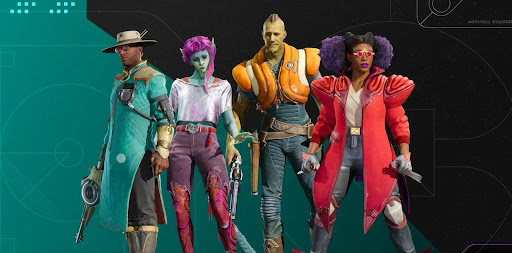
Anyway, what I’m saying is, the storytelling has to work with the gameplay, and while it can be tough to get those proportions just right and tempting to put it on the backburner, it could add up to be a game’s special sauce.
Take, for example, FALLOUT 76. When FALLOUT 76 launched it was a storytelling decision to have no human NPCs, enemies, or friendlies. In the context of the story it was because the end of all things had just occurred a scant quarter-of-a-century ago, and it was up to the players as Vault-Dwellers to rebuild America. Those outside the vaults had tried to survive, but they were all wiped out by one thing or another. Thus, the players would only talk with robots or computers or very talkative super mutants. There was still a story, but it had limited itself to be told a certain way, through audio logs and robotic voices. (By the way, some of those Responders audio logs are insanely good voice acting. Crazy good monologuing skills.) Two years after release, the “Wastelanders” update brought living human NPCs and characters back into the game. Put simply, an aspect of the story didn’t serve the gameplay, so the story was changed to better fit. After this course correction, FALLOUT 76 stayed online long enough to experience a boost of concurrent players thanks to the release of the FALLOUT TV series.
It’s a tough tightrope to walk, but many players respond well to a good underlying narrative, or even a simple reasoning for the events of a game. Save the galaxy, rebuild Appalachia, put that no-good, two-timin’ varmint in the dirt. If companies are so keen on having a reliably money-printing live-service game, they’d be remiss to not allow their studios to really harmonize the stories they want to tell with the gameplay they want to create.







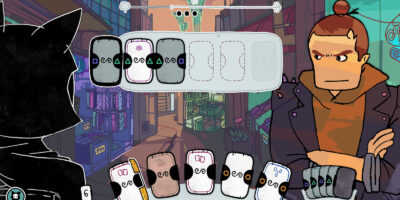








Comments